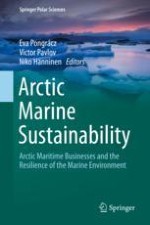2020 | OriginalPaper | Chapter
11. Arctic Marine Oil Spill Response Methods: Environmental Challenges and Technological Limitations
Author : Victor Pavlov
Published in: Arctic Marine Sustainability
Publisher: Springer International Publishing
Activate our intelligent search to find suitable subject content or patents.
Select sections of text to find matching patents with Artificial Intelligence. powered by
Select sections of text to find additional relevant content using AI-assisted search. powered by
